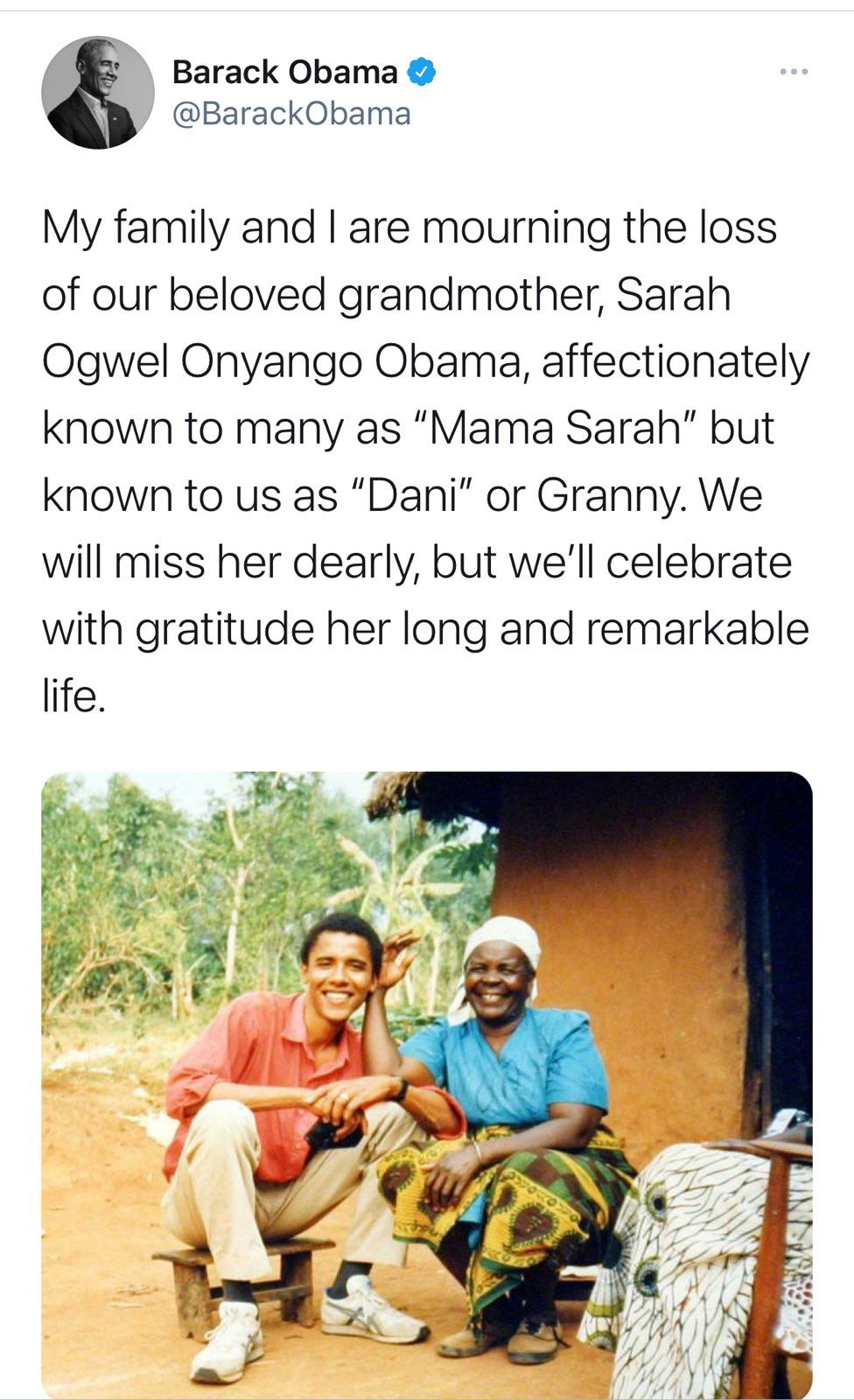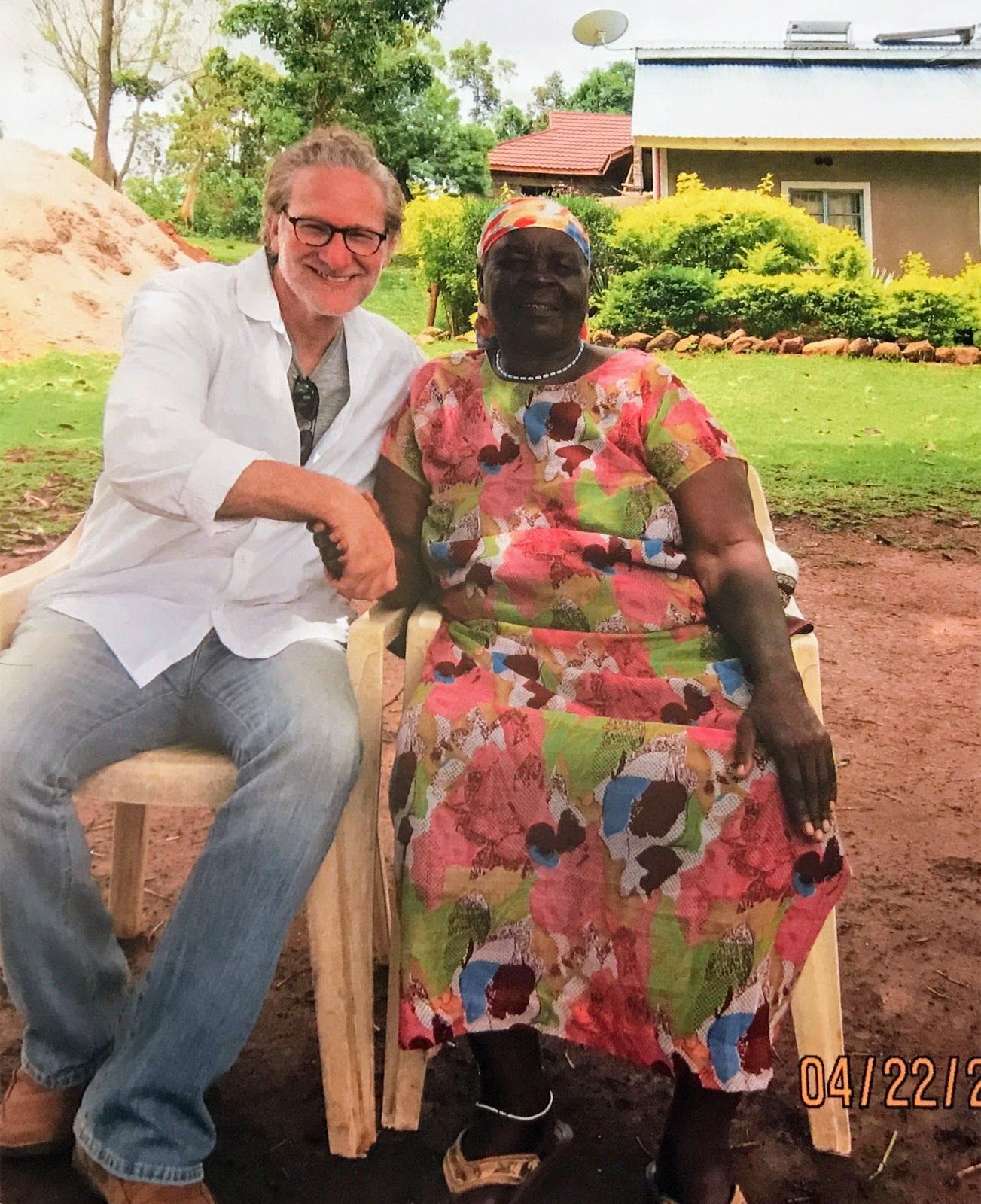Preface: On Monday, March 29, President Obama’s Kenyan grandmother, Sarah Onyango Obama, died at age 99.
My thoughts immediately went to a magical few hours I got to spend with her in her Kenyan home in 2015, while her grandson was the U.S. President. I was in Kenya by myself volunteering on a water project. On the last day, I had a few free hours; I had heard that she lived somewhere in the vicinity. Here is a blog entry I wrote that evening.


Sunday morning. Capped off the trip with the most bizarre and cool experience today. I had a crazy idea. I had heard that President Obama’s grandmother lived somewhere nearby and asked my driver-translator, Jacob, if we could stop by her house and say hello. “But she’s probably not available,” I said, “because it’s Sunday morning and she could be in church.”
“Not to worry,” Jacob smiled. “She’s a Muslim!”
Grandma Obama lives outside of the town of Kisumu, where I was catching a connection flight. I told Jacob I really wanted to go for it and off we went. The “road” to her village was long and muddy. We almost got stuck several times. But we kept on along the remote path, passing by random animals and countless Kenyans – many of them shoeless – carrying their daily loads on their heads. Was this really the land where the President’s family lives?
Jacob suggested we bring gifts. Apparently, “Grandma Sarah” supports many orphans in town, so it was suggested to bring her a carload full of groceries. So off we went to the tiny local grocery store. I grabbed a cart, and just kept throwing things into it – bread, milk, sugar, etc. That itself was surreal – “Am I really buying groceries for Obama's grandmother?” I kept thinking.
After a while, we came to some guard house and Jacob said something in Swahili to the guards as I held my breath. But all went smoothly and one of the guards jumped in the back of our truck. Step one accomplished.
We then drove another 20 minutes, until finally coming to a secluded, gated house with a Kenyan soldier in a small guardhouse. Jacob got out and conversed. There seemed to be a problem so I got out. Apparently, the issue was that it was Sunday and she normally doesn't take visitors on Sunday. So I flashed Scott's (my son, who worked at the Obama White House at the time) picture with President Obama. It worked! The guard agreed to go in the house and to see if she would come out. So I nervously waited, and about 5 minutes later he signaled for us to enter.
We walked along the property to a shady spot under a tree with a few chairs. All around were cows, goats, rabbits and chickens. As I sat down I was shocked to notice that immediately to my left were the graves of Obama's father and grandfather.
The weathered headstone of Obama’s father read “Barack Hussein Obama.” This was the place where he was raised and now buried, just a few feet from where I was sitting. It was such an eerie feeling. My brain knew this was really happening but it weirdly didn’t feel that way. I was keenly aware that I was someplace that few Americans would ever see, and I wanted to mentally record every moment.
Soon a woman appeared. It was not her. About 40 or so, very sharp, with wonderful English. We explained who we were and that we brought groceries. After a brief chat she went in the house, and told us to wait. I tried to remain calm. Was this really happening?
Grandma Sara emerged. She was remarkably spry. Not frail at all. Wearing a traditional African garb with like a “bandana,” she walked slowly to us, and smiled. We each shook her hand, and I kind of bowed a bit out of respect. She sat down and in Swahili told us to sit.
Jacob explained to her that I was a supporter of her grandson and had come to pay my respects and deliver groceries. I introduced myself. I first told her how much I appreciated her time on a Sunday. She said that “it is a blessing to receive visitors” and that I was welcome anytime, “even in the middle of the night.”
The other lady who had let me in started talking. I asked if she is part of the family. She told me that Grandma Sara is her mother, and that Barack's father was her brother. “So you're the President's aunt?" I asked. “Yes,” she said.
I asked lots of questions about Barack's father. When he died in 1984 in a car crash, he was Kenya's leading economist. Grandma Obama had walked him to school every day when he was young. She hammered home the importance of education, and told me that Barack, Sr. was number one in his school, which earned him a scholarship to college in Kenya, where he was also number one. There he met a group of missionaries, who encouraged him to apply for a scholarship to the University of Hawaii, where he met the President’s mother.
We talked about her husband and her extraordinary work with the orphans. She said she'll do this work “until her last breath.” I told her that she had indirectly affected the whole world, but she shrugged it off, saying “it’s all God's work.”
She told me that Barack and Michelle had visited her at the house, and she pointed to a nearby fence which Barack had fixed. She noted that Michelle apparently speaks a little Swahili and does a good job staying in touch with her.
After a while I sensed it was time to leave and I asked if I could take pictures of her, to which she said, “Of course. You’ll need proof this happened.”
Grandma Obama could not have been warmer and friendlier to me. When I told her I was supportive of her son, she smiled and thanked me, but she couldn’t hide her grandmotherly worry for him. She said that she was concerned about “all the stress” on her grandson’s shoulders. The deep love and connection she felt for her grandson – the most powerful man on the planet, some and 7,500 miles away – was palpable.
It was a beautiful, surreal experience that I'll forever cherish.
Comments
Sign in or become a Nu?Detroit member to join the conversation.
Just enter your email below to get a log in link.